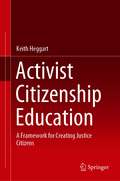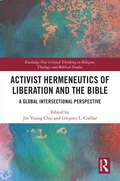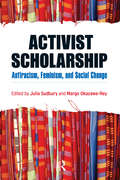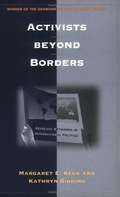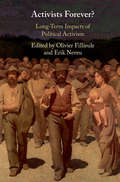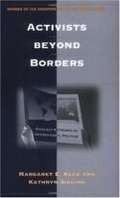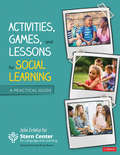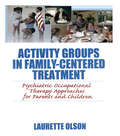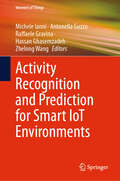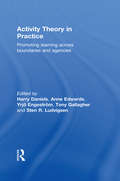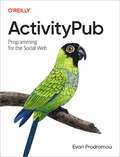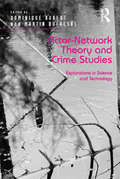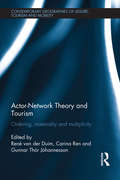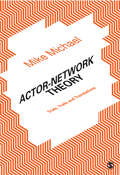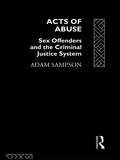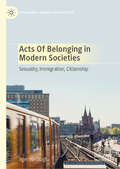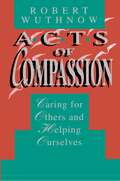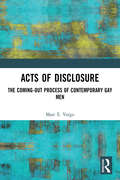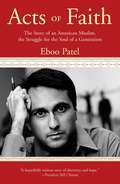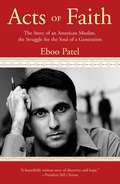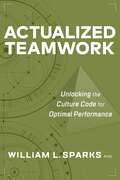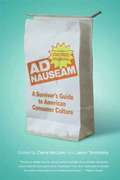- Table View
- List View
Activist Citizenship Education: A Framework for Creating Justice Citizens
by Keith HeggartThis book explores alternative models of civics and citizenship education. Specifically, it uses Justice Citizens, a participatory research and film-making project, as a tool to examine young people’s ideas about active citizenship and participation in public spaces. It introduces a framework that seeks to explore the diverse and apparently contradictory nature of young people’s active citizenship. The framework draws on complexity theory combined with critical pedagogy and democratic education to formulate an approach to developing active citizenship among young people. This approach extends theories of both critical pedagogy and education for citizenship, and by doing so seeks to explain the variegated nature of young people’s engagement with civil society. This book contains a valuable repository of ideas and resources for application for teachers to use in schools and classrooms. Academics engaged in initial teacher education, at both primary and secondary levels, will find the framework of use when describing the importance and new approaches to civics and citizenship education within the current school and policy environments.
Activist Hermeneutics of Liberation and the Bible: A Global Intersectional Perspective (Routledge New Critical Thinking in Religion, Theology and Biblical Studies)
by Jin Young Choi Gregory L. CuéllarInspired by the current political moment around the globe in which uprisings, protests, revolutions, and movements are on the rise, this book examines the intersections between the Bible and activism. It does this by showcasing intersectional readings of the Bible as an activist act and a tool for activism; historicizing the uses of the Bible within activist/freedom movements around the globe; and offering activist approaches to teaching the Bible.Each chapter in this volume provides a critical and substantive response from the discipline of Biblical Studies to global political trends. International in scope, with contributors from Africa, Asia, Caribbean, Europe, Latin America, Oceania and the United States, they address themes such as gender politics, racial injustices, violence toward women, political resistance, and activist hermeneutics and pedagogies. Together they harness the intellectual energies of minoritized Biblical scholars in a nonessentialist manner to reflect on the Bible as a tool for liberating social and political change. Reflecting on the activist potential of the Bible, this book will be of keen interest to scholars in Biblical Studies, Political Theology, and Religious Studies.
Activist Scholarship: Antiracism, Feminism, and Social Change
by Margo Okazawa-Rey Julia SudburyCan scholars generate knowledge and pedagogies that bolster local and global forms of resistance to U.S. imperialism, racial/gender oppression, and the economic violence of capitalist globalization? This book explores what happens when scholars create active engagements between the academy and communities of resistance. In so doing, it suggests a new direction for antiracist and feminist scholarship, rejecting models of academic radicalism that remain unaccountable to grassroots social movements. The authors explore the community and the academy as interlinked sites of struggle. This book provides models and the opportunity for critical reflection for students and faculty as they struggle to align their commitments to social justice with their roles in the academy. At the same time, they explore the tensions and challenges of engaging in such contested work.
Activists Beyond Borders: Advocacy Networks in International Politics
by Margaret E. Keck Kathryn SikkinkSurvey of non-governmental organizations' role in pressing for improvements in areas such as human rights, environmental stewardship and more.
Activists Forever?: Long-Term Impacts of Political Activism (Cambridge Studies in Contentious Politics)
by Olivier Fillieule Erik NeveuActivists Forever? explores the consequences of political involvement on an individual's life. While much of the research in this area has focused on the motivations of entire protests groups, the editors of this volume propose an approach that focuses on actors. This book examines political involvement's socio-biographical effects, or the ways in which political commitment generates or modifies dispositions to act, think, and perceive, in a way that is either consistent with or in contrast to the results of previous socialization. The contents explore what political involvement leads to rather than what causes involvement. Using a variety of case studies, this collection of essays provides global coverage with a focus on participation in major protests in the 1960s and significantly broadens our understanding by looking outside the United States. These essays look at the lasting effects of activists' knowledge, connections, and symbolic capital on their future participation in politics, as well as their personal and professional lives.
Activists beyond Borders
by Margaret E. Keck Kathryn SikkinkA masterful combination of emerging theory and empirical comparison of one of the most intriguing areas of transnational politics. Keck and Sikkink access a broad range of theory from social movements, international relations, and comparative politics research to glean from a wealth of their own research findings solid and thought-provoking conclusions about the most interesting and least well-understood area of contentious politics in the world today. -Sidney Tarrow, Cornell University (Government) "Activists beyond Borders is a searching exploration of advocacy networks, providing compelling accounts in areas such as human rights and environmental protection and an intriguing glimpse into the transnational politics of the twenty-first century. "-Robert O. Keohane, Duke University Margaret E. Keck and Kathryn Sikkink examine a type of pressure group that has been largely ignored by political analysts: networks of activists that coalesce and operate across national frontiers. Their targets may be international organizations or the policies of particular states. Historical examples of such transborder alliances include anti-slavery and woman suffrage campaigns. In the past two decades, transnational activism has had a significant impact in human rights, especially in Latin America, and advocacy networks have strongly influenced environmental politics as well. The authors also examine the emergence of an international campaign around violence against women.
Activities, Games, and Lessons for Social Learning: A Practical Guide
by Stern Center for Language and LearningIn these games, the prize is success in school—and life. Having good social skills doesn’t just affect classroom behavior—it’s the key to making learning stick. When students improve their self-regulation, social communication, and perspective-taking competencies, they are better prepared to challenge themselves academically, take on tough tasks, and collaborate with teachers and classmates to achieve real, lasting school success. And since these skills also improve life outside school, the benefits come full circle. Designed for both explicit instruction and "learning by doing," this practical guide provides hands-on activities that are easily adapted into any curriculum and can be used in general education, special education, after-school settings, and in the home. The design of each game keeps kids engaged and motivated, while educators benefit from clear, thorough explanations that unpack the complexities of social learning. Other behind-the-scenes features include: Evidence-based, teacher-tested lessons Anecdotes and real-world examples Links to relevant research Expansion ideas for applying learned skills to broader situations Templates and reproducibles for easy implementation This curated collection of activities puts social-learning theory into practice, helping even the most challenging children develop the social skills necessary for real success in school—and beyond.
Activities, Games, and Lessons for Social Learning: A Practical Guide
by Stern Center for Language and LearningIn these games, the prize is success in school—and life. Having good social skills doesn’t just affect classroom behavior—it’s the key to making learning stick. When students improve their self-regulation, social communication, and perspective-taking competencies, they are better prepared to challenge themselves academically, take on tough tasks, and collaborate with teachers and classmates to achieve real, lasting school success. And since these skills also improve life outside school, the benefits come full circle. Designed for both explicit instruction and "learning by doing," this practical guide provides hands-on activities that are easily adapted into any curriculum and can be used in general education, special education, after-school settings, and in the home. The design of each game keeps kids engaged and motivated, while educators benefit from clear, thorough explanations that unpack the complexities of social learning. Other behind-the-scenes features include: Evidence-based, teacher-tested lessons Anecdotes and real-world examples Links to relevant research Expansion ideas for applying learned skills to broader situations Templates and reproducibles for easy implementation This curated collection of activities puts social-learning theory into practice, helping even the most challenging children develop the social skills necessary for real success in school—and beyond.
Activity Groups in Family-Centered Treatment: Psychiatric Occupational Therapy Approaches for Parents and Children
by Laurette OlsonGet the tools for practical family-based interventions for children or adolescents with mental illness Providing parent-child occupation-based interventions can be one of the most important therapeutic services offered to children or parents with mental illness and their families. Activity Groups in Family-Centered Treatment: Psychiatric Occupational Therapy Approaches for Parents and Children provides useful in depth "how to" strategies into the processes of providing family occupation-based group intervention when a child has a mental illness. Occupational therapists working with children or parents with mental illness can learn valuable practical interventions to apply in their own clinical work.Cherished activities that strengthen parent-child bonds are many times lacking in families that include a child or parent with mental illness. Activity Groups in Family-Centered Treatment describes valuable parent-child occupation-based interventions with detailed examples of how they have been provided in therapy. This text provides an overview of the literature related to providing family-based psychiatric OT treatment for children and their families, a framework for providing services, rich descriptions of a parent-child activity group, a parent-adolescent activity group, and case studies of inpatient and home-based occupation based interventions.Topics in Activity Groups in Family-Centered Treatment include: an overview of theory and research literature on the nature of the interaction between parents and children with emotional disorders detailed case studies of family challenges with mental illness a framework for parent-child activity groups a qualitative study of a parent-child activity group analysis of the barriers that can arise in a parent-child activity group clinical experiences leading a parent-adolescent activity group analysis of the influences of culture within a parent-child activity group a case study of the intervention for a depressed mother and her family issues between parents and professionals when children are psychiatrically hospitalizedActivity Groups in Family-Centered Treatment provides occupational therapists and other professionals who lead parent-child groups or who work with families that include a child or parent with mental illness with integral tools to effectively treat their clients.
Activity Recognition and Prediction for Smart IoT Environments (Internet of Things)
by Raffaele Gravina Zhelong Wang Michele Ianni Antonella Guzzo Hassan GhasemzadehThis book provides the latest developments in activity recognition and prediction, with particular focus on the Internet of Things. The book covers advanced research and state of the art of activity prediction and its practical application in different IoT related contexts, ranging from industrial to scientific, from business to daily living, from education to government and so on. New algorithms, architectures, and methodologies are proposed, as well as solutions to existing challenges with a focus on security, privacy, and safety. The book is relevant to researchers, academics, professionals and students.
Activity Theory in Practice: Promoting Learning Across Boundaries and Agencies
by Anne Edwards Harry Daniels Yrjö Engeström Tony Gallagher Sten R. LudvigsenThis ground-breaking book brings together cutting-edge researchers who study the transformation of practice through the enhancement and transformation of expertise. This is an important moment for such a contribution because expertise is in transition - moving toward collaboration in inter-organizational fields and continuous shaping of transformations. To understand and master this transition, powerful new conceptual tools are needed and are provided here. The theoretical framework which has shaped these studies is Cultural Historical Activity Theory (CHAT). CHAT analyses how people and organisations learn to do something new, and how both individuals and organisations change. The theoretical and methodological tools used have their origins in the work of Lev Vygotsky and A.N. Leont’ev. In recent years this body of work has aroused significant interest across the social sciences, management and communication studies. Working as part of an integrated international team, the authors identify specific findings which are of direct interest to the academic community, such as: the analysis of vertical learning between operational and strategic levels within complex organizations; the refinement of notions of identity and subject position within CHAT; the introduction of the concept of ‘labour power’ into CHAT; the development of a method of analysing discourse which theoretically coheres with CHAT and the design of projects. Activity Theory in Practice will be highly useful to practitioners, researchers, students and policy-makers who are interested in conceptual and empirical issues in all aspects of ‘activity-based’ research.
ActivityPub: Programming for the Social Web
by Evan ProdromouActivityPub is the new standard for connecting social networks together on the social web. This open, decentralized social networking protocol defines an API for sharing activities to a social network and a procedure that servers use to distribute those activities to a subscriber's feed. With this book, you'll learn how to assemble ActivityPub-enabled clients for making new kinds of social apps on top of existing networks and build ActivityPub servers that create new human or automated accounts on the social web.With those skills under your belt, you can explore other applications of this publish-subscribe technology: content management systems, internet of things, and enterprise automation. With hands-on examples and in-depth knowledge from Evan Prodromou, one of the authors of the protocol, this is the ActivityPub handbook that every social software hacker needs.Learn what the social web is and what ActivityPub doesRepresent social network data in the Activity Streams 2.0 formatWrite a simple ActivityPub client and serverExtend ActivityPub's functionality with new typesFind in-depth details about the more obscure ActivityPub data structuresEvan Prodromou is a coauthor of the ActivityPub protocol and the Activity Streams 2.0 data format.
Actor-Network Theory and Crime Studies: Explorations in Science and Technology
by Dominique Robert Martin DufresneDeveloped by Bruno Latour and his collaborators, actor-network theory (ANT) offers crimes studies a worthy intellectual challenge. It requires us to take the performativity turn, consider the role of objects in our analysis and conceptualize all actants (human and non-human) as relational beings. Thus power is not the property of one party, but rather it is an effect of the relationships among actants. This innovative collection provides a series of empirical and theoretical contributions that shows: ¢ The importance of conceptualizing and analyzing technologies as crucial actants in crime and crime control. ¢ The many facets of ANT: its various uses, its theoretical blending with other approaches, its methodological implications for the field. ¢ The fruitfulness of ANT for studying technologies and crime studies: its potential and limitations for understanding the world and revamping crime studies research goals. Students, academics and policy-makers will benefit from reading this collection in order to explore criminology-related topics in a different way.
Actor-Network Theory and Tourism: Ordering, Materiality and Multiplicity (Contemporary Geographies of Leisure, Tourism and Mobility)
by René van der Duim Carina Ren Gunnar Thór JóhannessonThe recent surfacing of actor-network theory (ANT) in tourism studies correlates to a rising interest in understanding tourism as emergent thorough relational practice connecting cultures, natures and technologies in multifarious ways. Despite the widespread application of ANT across the social sciences, no book has dealt with the practical and theoretical implications of using ANT in Tourism research. This is the first book to critically engage with the use of ANT in tourism studies. By doing so, it challenges approaches that have dominated the literature for the last twenty years and casts new light on issues of materiality, ordering and networks in tourism. The book describes the approach, its possibilities and limitations as an ontology and research methodology, and advances its use and research in the field of tourism.The first three chapters of the book introduce ANT and its key conceptual premises, the book itself and the relation between ANT and tourism studies. Using illustrative cases and examples, the subsequent chapters deal with specific subject areas like materiality, risk, mobilities and ordering and show how ANT contributes to tourism studies. This part presents examples and cases which illustrate the use of the approach in a critical way. Inherently, the study of tourism is a multi-disciplinary field of research and that is reflected in the diverse academic backgrounds of the contributing authors to provide a broad post-disciplinary context of ANT in tourism studies. This unique book, focusing on emerging approaches in tourism research, will be of value to students, researchers and academics in tourism as well as the wider Social Sciences.
Actor-Network Theory: Trials, Trails and Translations
by Mike MichaelIn this thought-provoking and engaging book, Mike Michael brings us a powerful overview of Actor-Network Theory. Covering a breadth of topics, Michael demonstrates how ANT has become a major theoretical framework, influencing scholarly work across a range of fields. Critical and playful, this book fills a notable gap in the literature as Michael expertly explicates the theory and demonstrates how its key concepts can be applied. Comparing and contrasting ANT with other social scientific perspectives, Michael provides a robust and reflexive account of its analytic and empirical promise. A perfect companion for any student of Science and Technology Studies, Sociology, Geography, Management & Organisation Studies, Media & Communication, and Cultural Studies.
Actor-Network Theory: Trials, Trails and Translations
by Mike MichaelIn this thought-provoking and engaging book, Mike Michael brings us a powerful overview of Actor-Network Theory. Covering a breadth of topics, Michael demonstrates how ANT has become a major theoretical framework, influencing scholarly work across a range of fields. Critical and playful, this book fills a notable gap in the literature as Michael expertly explicates the theory and demonstrates how its key concepts can be applied. Comparing and contrasting ANT with other social scientific perspectives, Michael provides a robust and reflexive account of its analytic and empirical promise. A perfect companion for any student of Science and Technology Studies, Sociology, Geography, Management & Organisation Studies, Media & Communication, and Cultural Studies.
Acts of Abuse: Sex Offenders and the Criminal Justice System
by Adam SampsonSexual crime is a topic of massive public concern. Yet the debate over its causes and the appropriate responses of the criminal justice system is often fuelled by ignorance and prejudice, with little understanding of the reality of sexual crime.Acts of Abuse explores the response of the criminal justice system to this important issue. Its author, Adam Sampson, examines the existing research about the causes of rape and child abuse, the number of offences being committed, and the policy of the courts. He then examines in detail the responses of the probation service and the prison system to the increased number of offenders with which they are being required to deal.Written by a prominent critic of the British penal system, this is the first comprehensive survey of the phenomenon of sexual crime in the British penal context. It will appeal to students and all those with an interest in issues relating to crime and justice.
Acts of Belonging in Modern Societies: Sexuality, Immigration, Citizenship (Citizenship, Gender and Diversity)
by Ilgın YörükoğluThis book examines the ways in which the need to belong manifests itself in the post 9/11 world, from a cross-disciplinary perspective. Using queer Turkish women in Berlin as its subjects, the book shows how individuals with seemingly contradictory belongings develop strategies of emotional survival in the face of conflict, which Yorukoglu terms “acts of belonging”. It studies the impact of populist discourses on minorities, exploring concepts such as security, integration, sexual tolerance and cohesion within a causal relationship. Questioning this assumed relationship, the book proposes an alternative approach to study belonging. Acts Of Belonging in Modern Societies supports the empirical research behind the argument that cohesion is not a "sine qua non" of belonging. These acts allow the individual to claim belonging in spite of possible differences. The book provides evocative case studies to reveal the affective, dynamic, complex nature of human connectedness.
Acts of Compassion: Caring for Others and Helping Ourselves
by Robert WuthnowRobert Wuthnow finds that those who are most involved in acts of compassion are no less individualistic than anyone else--and that those who are the most intensely individualistic are no less involved in caring for others.
Acts of Consciousness
by Guy SaundersDrawing on compelling material from research interviews with former hostages and political prisoners, Guy Saunders reworks three classic thought experiment stories: Parfit's 'Teleporter', Nagel's 'What is it like to be a bat?' and Jackson's 'Mary the colour scientist' to form a fresh look at the study of consciousness. By examining consciousness from a social psychology perspective, Saunders develops a 'cubist psychology of consciousness' through which he challenges the accepted wisdom of mainstream approaches by arguing that people can act freely. What makes 'cubist psychology' is both the many examples taken from different viewpoints and the multiple ways of looking at the key issues of person, mind and world. This is a unique and engaging book that will appeal to students and academics in the field of consciousness studies and other readers with an interest in consciousness.
Acts of Disclosure: The Coming-Out Process of Contemporary Gay Men
by Marc E. VargoConfronting the psychological, social, sexual, legal, and political issues at stake in the coming-out process, Acts of Disclosure: The Coming-Out Process of Contemporary Gay Men uses research findings and first-hand accounts to help gay adolescents and men accept and embrace their sexual identity as an integral part of their being. Offering helpful advice and specific suggestions that will guide you through the coming-out process, this text also teaches family, friends, and colleagues how they can support and encourage you in this challenge.A roadmap through the confusing process of coming to terms with your sexuality both privately and publicly, Acts of Disclosure walks you step-by-step through the stages of coming out, the emotions involved, the potential pitfalls, and the kinds of receptions you may meet. It points out both healthy and self-destructive coping strategies and teaches you how to take responsibility for your sexuality. You will find its discussions straightforward, honest, and direct, as it broaches the following topics: coming out in American schools expressing your sexual identity on the job the harmful effects of involuntary public exposure why some parents adjust better than others to the fact that they have a gay child the damaging effects of social myths attached to homosexuality the emotional and behavioral reactions wives have after discovering that their husbands are gay how to anticipate a possible “outing” against oneself and the advantages of coming out to prevent such an act compulsory social programming that may be deeply injurious to gay adolescents disclosing your sexual identity after the onset of AIDSGay males of all ages, parents, friends, children, therapists, psychologists, social workers, and educators who read Acts of Disclosure will realize their error in treating gay sexual identity as undesirable, shameful, or second-rate. As you turn the last page of this comprehensive and enlightening book, you will likely find yourself with an appreciation of gay male sexuality as well as with a better understanding of the complexities of human nature.
Acts of Faith: The Story of an American Muslim, the Struggle for the Soul of a Generation
by Eboo PatelPatel (founder and executive director, Interfaith Youth Core, "a Chicago-based international nonprofit building the interfaith youth movement") is an Indian Muslim who grew up outside of Chicago. In this memoir, he explores the evolution of his own religious and cultural identity as he gradually came to reject anger at being excluded from mainstream American society in order to promote interfaith awareness with a focus on younger generations.
Acts of Faith: The Story of an American Muslim, the Struggle for the Soul of a Generation
by Eboo PatelActs of Faith is a remarkable account of growing up Muslim in America and coming to believe in religious pluralism, from one of the most prominent faith leaders in the United States. Eboo Patel's story is a hopeful and moving testament to the power and passion of young people-and of the world-changing potential of an interfaith youth movement.
Actualized Teamwork: Unlocking the Culture Code for Optimal Performance
by William L. SparksWhy do some teams thrive while others stall? The answer lies in team culture and the emotional dynamics that shape it.In Actualized Teamwork, bestselling author Will Sparks introduces the concept of "team-actualization" and provides a research-backed framework for diagnosing and improving team performance. The book presents a clear, evidence-based methodology to assess culture, strengthen communication, build trust and increase engagement. Readers will discover the 5 Dimensions of Teamwork and learn practical strategies for enhancing each, supported by tools and examples from real teams.Accessible and actionable, this book includes a free team assessment and is an essential guide for leaders seeking to unlock the full potential of their teams.
Ad Nauseam: A Survivor's Guide to American Consumer Culture
by Carrie McLaren Jason TorchinskyWith the style and irreverence of Vice magazine and the critique of the corporatocracy that made Naomi Klein's No Logo a global hit, the cult magazine Stay Free!—long considered the Adbusters of the United States—is finally offering a compendium of new and previously published material on the impact of consumer culture on our lives. The book questions, in the broadest sense, what happens to human beings when their brains are constantly assaulted by advertising and corporate messages. Most people assert that advertising is easily ignored and doesn't have any effect on them or their decision making, but Ad Nauseam shows that consumer pop culture does take its toll. <p><p> In an engaging, accessible, and graphically appealing style, Carrie McLaren and Jason Torchinsky (as well as contributors such as David Cross, The Onion's Joe Garden, The New York Times's Julie Scelfo, and others) discuss everything from why the TV program CSI affects jury selection, to the methods by which market researchers stalk shoppers, to how advertising strategy is like dog training. The result is an entertaining and eye-opening account of the many ways consumer culture continues to pervade and transform American life.
